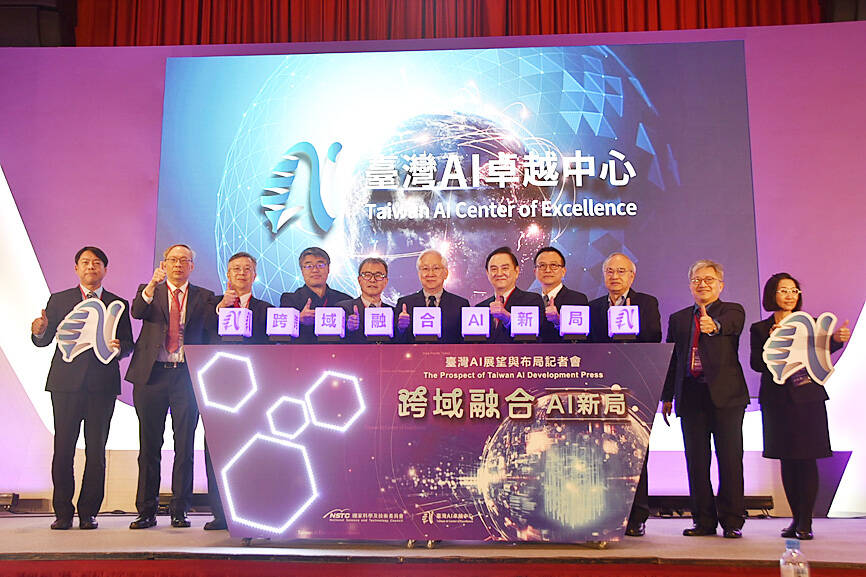The National Science and Technology Council on Tuesday opened the Taiwan AI Center of Excellence (Taiwan AICoE), tasked with developing the nation’s artificial intelligence (AI) capability.
At a launch ceremony in Taipei, Minister of Science and Technology Wu Tsung-tsong (吳政忠) said that AI applications have advanced rapidly and become an integral part of everyday life since the government set 2017 as “year zero” for Taiwan’s AI industry.
The launch last year of ChatGPT, developed by US-based OpenAI, caught China and Japan off guard, and has presented new challenges such as questions regarding the ethics, rule of law and human rights associated with the use of AI, Wu said.

Photo: Wu Po-hsuan, Taipei Times
The council is vigorously formulating ethical and general principles in an intergovernmental effort to codify terms governing the use of AI to bring Taiwan in line with global AI initiatives, while leveraging Taiwan’s international influence in the field of AI governance, he said.
Wu said he hopes that the center, which is run by the council, would serve as a platform to streamline efforts by government agencies seeking to formulate rules governing AI applications and facilitate collaborations on international AI projects.
Taiwan AICoE head Tsai Zse-hong (蔡志宏) said the center would seek to initiate international collaborations on enhancing core AI technologies, creating an AI talent pool in the Asia-Pacific region by tapping into leading international AI institutions and joining “human-centered” AI organizations to forge reliable partnerships around the technology with like-minded countries.
Taiwan AICoE is in talks with international institutions on several AI proposals and would serve as Taiwan’s point of contact for international projects as well as provide guidance on the planning and development of the local AI sector, Tsai said.
Asked about progress on the National Science and Technology Council’s plan to develop a “Taiwanese ChatGPT” for public use, Tsai said it is close to putting together a team to collate data suited to Taiwanese society and culture, at which point it would test such software.
Wu has set a deadline for projects to start producing tangible results by the end of this year, Tsai added.
Expansions are planned for the AI-powered Taiwania 2 supercomputer developed by the National Applied Research Laboratories to accommodate the project and create a Taiwanese ChatGPT, he said.
Current efforts are focused on testing computing power and datasets, which Taiwania 2’s more than 2,000 graphics processing units should be able to cover, he said.

MULTIFACETED: A task force has analyzed possible scenarios and created responses to assist domestic industries in dealing with US tariffs, the economics minister said The Executive Yuan is tomorrow to announce countermeasures to US President Donald Trump’s planned reciprocal tariffs, although the details of the plan would not be made public until Monday next week, Minister of Economic Affairs J.W. Kuo (郭智輝) said yesterday. The Cabinet established an economic and trade task force in November last year to deal with US trade and tariff related issues, Kuo told reporters outside the legislature in Taipei. The task force has been analyzing and evaluating all kinds of scenarios to identify suitable responses and determine how best to assist domestic industries in managing the effects of Trump’s tariffs, he

TIGHT-LIPPED: UMC said it had no merger plans at the moment, after Nikkei Asia reported that the firm and GlobalFoundries were considering restarting merger talks United Microelectronics Corp (UMC, 聯電), the world’s No. 4 contract chipmaker, yesterday launched a new US$5 billion 12-inch chip factory in Singapore as part of its latest effort to diversify its manufacturing footprint amid growing geopolitical risks. The new factory, adjacent to UMC’s existing Singapore fab in the Pasir Res Wafer Fab Park, is scheduled to enter volume production next year, utilizing mature 22-nanometer and 28-nanometer process technologies, UMC said in a statement. The company plans to invest US$5 billion during the first phase of the new fab, which would have an installed capacity of 30,000 12-inch wafers per month, it said. The

Taiwan’s official purchasing managers’ index (PMI) last month rose 0.2 percentage points to 54.2, in a second consecutive month of expansion, thanks to front-loading demand intended to avoid potential US tariff hikes, the Chung-Hua Institution for Economic Research (CIER, 中華經濟研究院) said yesterday. While short-term demand appeared robust, uncertainties rose due to US President Donald Trump’s unpredictable trade policy, CIER president Lien Hsien-ming (連賢明) told a news conference in Taipei. Taiwan’s economy this year would be characterized by high-level fluctuations and the volatility would be wilder than most expect, Lien said Demand for electronics, particularly semiconductors, continues to benefit from US technology giants’ effort

‘SWASTICAR’: Tesla CEO Elon Musk’s close association with Donald Trump has prompted opponents to brand him a ‘Nazi’ and resulted in a dramatic drop in sales Demonstrators descended on Tesla Inc dealerships across the US, and in Europe and Canada on Saturday to protest company chief Elon Musk, who has amassed extraordinary power as a top adviser to US President Donald Trump. Waving signs with messages such as “Musk is stealing our money” and “Reclaim our country,” the protests largely took place peacefully following fiery episodes of vandalism on Tesla vehicles, dealerships and other facilities in recent weeks that US officials have denounced as terrorism. Hundreds rallied on Saturday outside the Tesla dealership in Manhattan. Some blasted Musk, the world’s richest man, while others demanded the shuttering of his